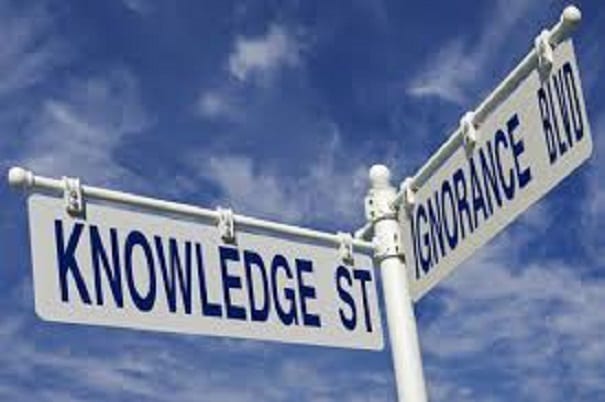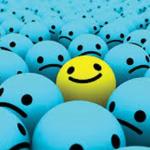A continuing theme of my various classes over the first three weeks of the semester has, not surprisingly, been the cognitive dissonance surrounding just about everything currently in this country. A seminar with eleven honors students on John Locke’s political thought included speculation about what Locke might want to say to anti-vaxxers, those who believe without evidence that the November 2020 presidential election was stolen, and the general attitude that if my side doesn’t win something nefarious and corrupt must be going on. In my ethics classes, we have been wondering why it is so easy to be convinced without evidence that one’s particular and peculiar beliefs are not only true but also objectively binding on everyone else, even those who believe differently. Suffice it to say that it isn’t difficult these days to make philosophy relevant.

In 1980, famed science-fiction writer Isaac Asimov wrote the following in an opinion piece for Newsweek:
There is a cult of ignorance in the United States, and there has always been. The strain of anti-intellectualism has been a constant thread winding its way through our political and cultural life, nurtured by the false notion that democracy means that “my ignorance is just as good as your knowledge.
Here we are, more than forty years after Asimov’s opinion piece, and his observation is, if anything, more obviously true now than when he wrote it. Mix a widespread commitment to ignorance together with a general disregard for facts and evidence-based truth, and we find ourselves in one of the most polluted and asphyxiating cognitive atmospheres imaginable.
Asimov was convinced that American society is particularly susceptible to this cult of ignorance, and there is little in our common experience to challenge his observation. Still, a passage from one of my favorite mystery novel series raised the possibility that the problem Asimov described might not be a uniquely American affliction. It might, more broadly and problematically, be a human problem.
Donna Leon’s Guido Brunetti mystery series, now including more than twenty-five novels, is set in Venice (the original one in Italy, to distinguish it from the ones in CA, FL, and LA). I began the series, on the recommendation of a colleague and friend in the English department, a bit over a year ago—I’m in currently in book seventeen or eighteen. It’s a terrific series. In Dressed for Death, the third novel in the series, we learn a bit about Vianello, Brunetti’s frequent police partner in solving cases. Vianello, a life-long sun worshipper, had been diagnosed with skin cancer several months earlier. After the removal of five melanomas from his back and shoulders, he was a new man this summer and on a mission.
Like Saul on the road to Damascus, Vianello had experienced conversion, and, like Paul, he had tried to spread his particular gospel. Vianello had not, however, counted on one of the qualities basic to the Italian character: omniscience. Everyone he spoke to knew more than he did about this issue, knew more about the ozone layer, about chlorofluorocarbons and their effects upon the atmosphere. What is more, all of them, and this to a man, knew that this talk of danger from the sun was just another swindle, another trick, although no one was quite certain just what this swindle was in aid of.
Throughout Leon’s novels, we learn a great deal not only about mystery-solving in Italy, but also about Italian society and character (Leon is American-born but has taught and lived in Italy for most of her adult life). But what Vianello encountered is not a uniquely Italian characteristic—we know that it is rampant in this country as well and seems to be embedded naturally in human nature. Indeed, more than two millennia ago, Protagoras understated the point when he observed that “Man is the measure of all things.” More truthfully, each of us believes that “I am the measure of all things.” If I believe it, it must be true. And anyone trying to change my mind or behavior must have a hidden, most like insidious, agenda.
But that’s not all that Vianello encountered when he simply tried to change people’s minds and behavior on the basis of his own experience.
When Vianello, still filled with Pauline zeal, had attempted to argue form the scars on his back, he was told his particular case proved nothing, that all of the statistics were false; besides, it wouldn’t happen to them. And he had then come to realize that most remarkable of truths about Italians: no truth existed beyond personal experience, and all evidence that contradicted personal belief was to be dismissed.
In other words, “If I haven’t experienced it, it can’t happen.” “If this isn’t something that I want to believe, it can’t be true.” “If this data conflicts with a belief that is important to me, I choose to reject the data rather than to adjust my belief.” Spend a few minutes on Twitter or your favorite social media outlet and you’ll find all of the above it all its glory.
Simply seeing the above sentences in black and white should be sufficient to demonstrate how ludicrous they are. But once again, there is a Protagoras in each of us: I am the decider of what is true and what is not, and my criteria for that decision are my own experience and what I want to be true. On a walk during the early weeks of pandemic shutdown eighteen months ago, Jeanne provided me with that day’s example of a phenomenon that all of us are bombarded with every day. The spouse of a well-regarded Protestant religious leader had just posted on Instagram that although formerly trustworthy sources agree that at the time over 180,000 (and counting) of her fellow American citizens have died of coronavirus, that’s a hoax. That’s fake news. “In fact,” she wrote, “only about 10,000 people have died of Covid-19.”
Why, in the face of massive data and facts to the contrary, would a presumably intelligent adult choose to believe this? Given our natural human tendency to believe what we want to believe, then baptize that belief as truth, rather than seeking to conform what we believe to what is demonstrably true, a good question to ask might be Why do I want to believe this? Why, in the face of contrary facts and data, is it important for me to reject the facts and hang on to this belief? What is at stake here? In the case of the woman in the above paragraph, someone who (along with her husband and his many thousands of followers) was and continues to be an evangelical Christian supporter of Donald Trump, the truth that 180,000 people had died on Donald Trump’s watch was inconvenient, to say the least. Therefore, it must not be true.
This dynamic has become so familiar over the past few years that many of us, myself included, have become numbed to it. But it is imperative to become deliberate and consistent fact-checkers—on our own beliefs. It may be part of human nature to twist facts beyond recognition in order to fit them into straitjackets of belief, but it is dangerous. Deliberate ignorance is both dangerous and deadly, as Albert Camus described in his novel The Plague.
On the whole, men are more good than bad; that, however, isn’t the real point. But they are more or less ignorant, and it is this that we call vice or virtue; the most incorrigible vice being that of an ignorance that fancies it knows everything and therefore claims for itself the right to kill. The soul of the murderer is blind; and there can be no true goodness nor true love without the utmost clearsightedness.












